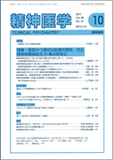Japanese
English
- 有料閲覧
- Abstract 文献概要
- 1ページ目 Look Inside
- 参考文献 Reference
抄録
摂食障害のリハビリテーション施設ミモザに通所経験のある摂食障害76名を対象として,慢性化した摂食障害の回復について調査を行った。対象は平均35歳で,発症から17年が経過していた。摂食障害の症状が消失した症状消失群34名を,ED/NOSの状態にある18名,いまだに症状がある24名と比較し,症状消失群は,併存症のうつ病,社交不安障害,強迫性障害などのチェックリストの平均スコアは有意に低く,回復についてのスケールでも有意に回復を示していた。しかし,症状消失群も52.9%が精神科併存症の治療を受けていて他の群との差がなく,再発経験も32%持っていた。慢性化した摂食障害は緩やかに回復するが,十分な健康状態にまで回復することは困難と考えられる。
A survey was conducted of 76 women with chronic eating disorders, to assess their recovered states. The subjects had participated in a rehabilitation program at the community-based rehabilitation center named Mimoza. The mean age of the subjects was 35 years, and they had suffered from eating disorders for an average of 17 years. Among the subjects, 34 did not have any symptoms of eating disorders (symptom-free group), 18 were diagnosed as having ED/NOS according to DSM-Ⅳ, and 24 were diagnosed as having anorexia nervosa or bulimia nervosa. Comparison of the symptom-free group with the other two groups revealed a lower mean score on the check-list of comorbid mental disorders such as depression, social anxiety disorder and obsessive-compulsive disorder, fewer comorbid mental disorders, and higher recovery scores of social skills in the assessment conducted by the authors in the symptom-free group than in the other two groups. On the other hand, over a half of the subjects of the symptom-free group needed treatment for comorbid mental disorders, and 32% experienced relapse. The results of the study suggest that patients with chronic eating disorders did not recover sufficiently to a healthy state even after the eating disorders have resolved.

Copyright © 2014, Igaku-Shoin Ltd. All rights reserved.


